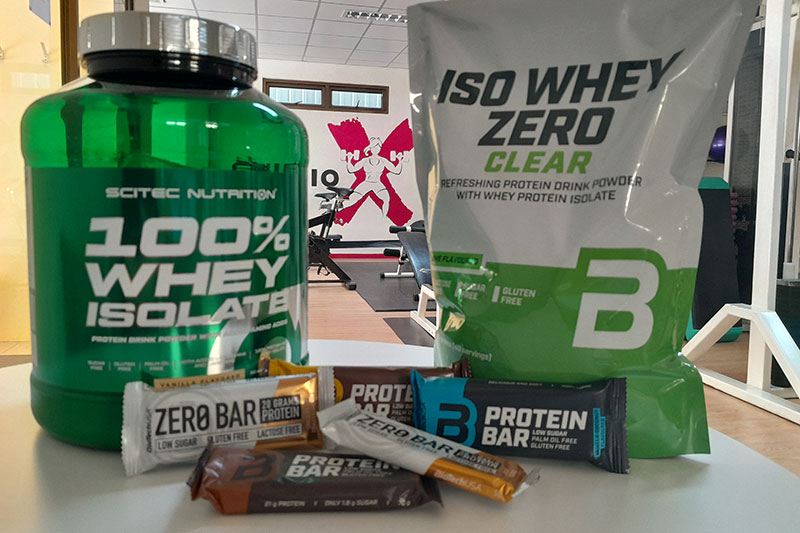Protein is often called the “building block of life” for a reason. It’s crucial for building and maintaining muscles, supporting metabolism, and overall health. But how much protein do you really need?
Table of Contents
- Why do we need so much protein?
- Getting enough protein can be a challenge
- The importance of protein when trying to lose fat
- The role of supplements
- Can you have too much protein?
Medical professionals generally agree that healthy adults should eat in the range of 1.5 to 2 grams of protein per kilogram of target weight. For the average person, this means a daily intake of more than 100 grams of protein.
Why do we need so much protein?
Protein plays a foundational role in nearly every function of the human body. It supports tissue repair, muscle growth, hormone production, and immune function. Adequate protein intake is crucial for achieving specific fitness goals beyond its physiological benefits.
- Muscle Maintenance and Growth: Protein is the primary building block for muscle tissue. Whether you’re recovering from a workout or just maintaining your muscle mass, protein ensures that your muscles have the resources they need to repair and grow stronger.
- Metabolism Support: Muscle tissue burns more calories at rest than fat tissue does, so having more muscle can help support a higher metabolism. Protein helps preserve that muscle during fat loss, ensuring that your body burns fat instead of muscle.
- Immune System Function: Proteins play a crucial role in the body’s immune response. Antibodies, which fight off infections and foreign invaders, are made of proteins. Adequate protein intake supports the immune system by helping the body produce these essential antibodies and other immune system components.
- Healthy Aging: As we age, our bodies naturally start to lose muscle mass—a condition known as sarcopenia. Ensuring adequate protein intake can help slow down this process, keeping us stronger and more active later in life as we grow older.
Getting enough protein can be a challenge
Eating 100 grams or more of protein per day can be challenging. Since it’s best to aim for ± 33 grams in each meal, you need to plan what you eat.
Here’s what 33 grams of protein looks like in common foods:
- 130 grams of chicken breast (215 calories)
- 5-6 large eggs (470 calories)
- 1 can of tuna (in water): (135 calories)
When following a vegan or plant-based diet, it gets a little harder. Servings of high-protein meat alternatives usually come with a lot of calories.
- 400 grams of tofu (300 calories)
- 350 grams of cooked chickpeas (575 calories)
- 750 grams of cooked quinoa (900 calories)
- 8 tablespoons of peanut butter (750 calories)
- 20 tablespoons of chia seeds (1000 calories)
Please do NOT eat this much chia seeds!!!! It will cause severe stomach problems.
You see that it adds up to quite a lot of food to get to 100 grams of protein per day. And you have to be aware that these foods are not pure protein. They come with calories from fats and carbs. For example, to get 33 grams of protein from peanut butter alone, you will also consume 128 grams of fat.
Maintaining a high-protein diet can be a challenge every day. But this is especially true when you also try to lose body fat by cutting calories.

The importance of protein when trying to lose fat
One of the biggest mistakes people make when trying to lose fat is cutting protein intake. Foods that are high in protein are usually calorie-dense. And according to the law of thermodynamics, it would make sense to cut out the foods with the highest amount of calories.
However, cutting out protein can lead to the loss of lean muscle mass, which slows down metabolism and results in a higher body fat percentage. These two things are exactly what you should avoid.
When losing fat, maintaining muscle is key. Protein helps preserve that muscle mass, even in a calorie deficit. By keeping your protein intake high and focusing on strength training, you’re more likely to lose fat while retaining muscle, leading to better overall body composition.
The role of supplements
Getting enough protein from whole foods can be a challenge, especially when trying to balance all macronutrients. Protein supplements are therefore very useful. Protein powders or bars can help you reach your daily protein goals without adding too many extra calories.
However, they should not be seen as replacements for real food, but rather as convenient options for when you’re in a pinch or need extra protein post-workout.
Can you have too much protein?
While protein is essential for muscle growth, repair, and overall health, it is possible to have too much protein. Although it’s rare for most people to over-consume protein to harmful levels, it’s important to recognize the potential side effects, such as kidney strain, dehydration, constipation, bloating and fat gain.
While a high-protein diet is generally safe for most people, it’s important to ensure balance with other macronutrients and sufficient hydration to avoid any unwanted effects.

